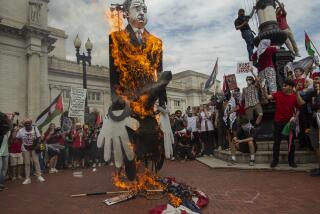Platform : ‘Recapture . . . Our Greatest Era’
- Share via
Nation of Islam leader Louis Farrakhan has called on black men to march in Washington Oct. 16 as a day of atonement and reconciliation. Though women were not invited to the march itself, many are helping to organize it. All blacks were asked to stay away from school, work, and entertainment to mark the day. Many Protestant ministers and African American social, political and professional organizations have endorsed the effort. Angelenos talked to MARY REESE BOYKIN about the Million Man March.
*
PAUL MANNING Jr.
California state employee, Inglewood
I’ll be there. I feel that it if something that should have come a long time ago. There has been a lull since [the Rev. Martin Luther]. King.
So many adverse things affect the [African American] community: racism, crime, drive-by shootings, unwed mothers. The march will be symbolic to African Americans; it will pull us back together. I don’t think that we have lost our way, but why not recapture the ‘60s, one of our greatest eras? We can draw from this for a long time. The march brings together lots of people and community organizations. I just feel good about it.
There has always been a negative connotation to describe the black man. This march will remind America that the black man is alive and well. We’ll stand up and show it--that we are the heads of our household. I am. For most of my marriage, my wife has not worked outside of the home. We have two daughters who are UCLA graduates, a daughter at the University of Nevada at Las Vegas, a son in probation and counseling. My father was the head of his home. He sent six kids to college. This image of the absent black male happens, but it is not as big as they make it out to be.
*
CLINT C. WILSON Sr.
Editorial cartoonist, Los Angeles Sentinel
I am not going to the march, but I support it. [Nation of Islam leader Louis] Farra khan gets all of these people together--of different denominations and those not a member of any group--and lets the world know that we can get together for a common cause.
The day of absence will have its effect too. Nationally, blacks spend $280 million a day. So the “no buying” part of the event will show our great collective buying power and economic strength.
*
CHARLES H. FINLEY Jr.
Corporation president, Santa Monica
From my perspective I wouldn’t [miss work.] It doesn’t accomplish anything useful. I am in a position of providing jobs and training to help people advance their skills, so if we want to make this a black thing, then I have black people working for me, and I feel that everyday that they are here, they are helping themselves by earning a living and upgrading their skills.
If my employees wish to take the day off, it’s entirely their decision. I am not going to judge whether or not they should. Their absence would obviously affect the business, but we have a policy that allows for personal days off.
*
MAULANA KARENGA
Chairman, Black Studies Department, Cal State Long Beach
I am a member of the executive committee of the national organizing committee for the Million Man March. The community’s response . . . makes me sense that this is an idea whose time has come.
The day of absence is important because it is a parallel activity that forms with the Million Man March, a joint and cooperative whole project. Women are in the leadership of this, just as men are in the leadership of the march.
It’s also a day when we do voters registration, both at the march and community forums of the day of absence. Contributions will be collected for the national black united fund, which is a fundamental goal of the march: to let it be a takeoff point for launching a massive campaign to develop a black economic develop a black economic development fund.
*
DORETHA HALL
Boutique owner, Los Angeles
I sell men’s and women’s clothing, so lots of my customers are men. Many of them have told me that they are going to the march. They are doctors, lawyers, policemen and working class men. I know some men who are financially unable to go, but they are trying their best to get there. Just last night, a friend called and said he is scheduled for a trip at that time but is re-routing so that he is in D.C. on Oct. 16. I want white America to see what a million black men look like as they stand together for a common cause.
*
T. LARRY KIRKLAND
Pastor, Brookins AME Church, Los Angeles
Farrakhan has represented a different ideology and a somewhat different philosophy [from that of Christian ministers], and he has been pulled out by the media and much of white America as a hatemonger. We don’t believe that is true, and that’s why we support him. The struggle for equality in America rises above our petty differences, so though we don’t agree with all that he teaches, we support him because what he is doing is in the best interest of America, definitely in the best interest of black America.
The black man has been the most ostracized, mistreated person in America. I am going to the march because I want to be very much a part of supporting anything that lifts black men.
More to Read
Sign up for Essential California
The most important California stories and recommendations in your inbox every morning.
You may occasionally receive promotional content from the Los Angeles Times.










